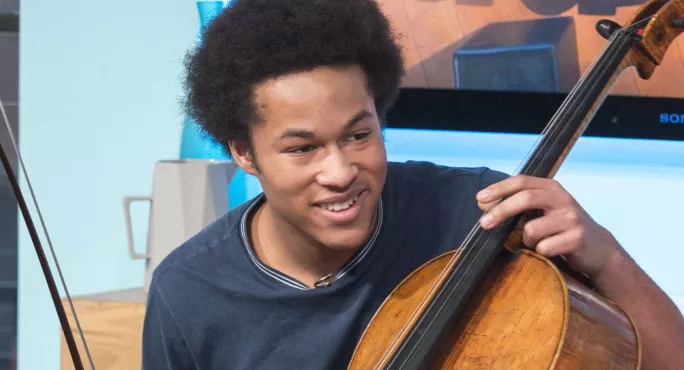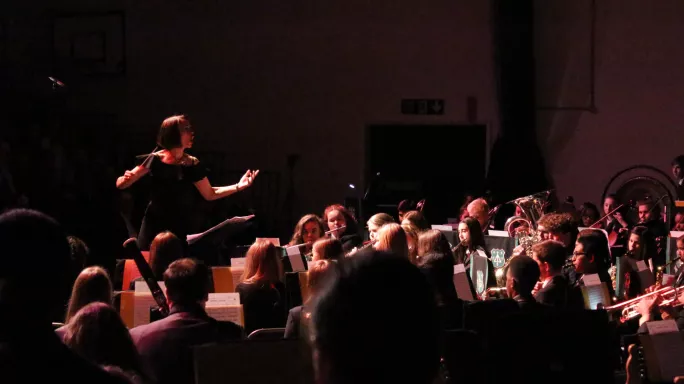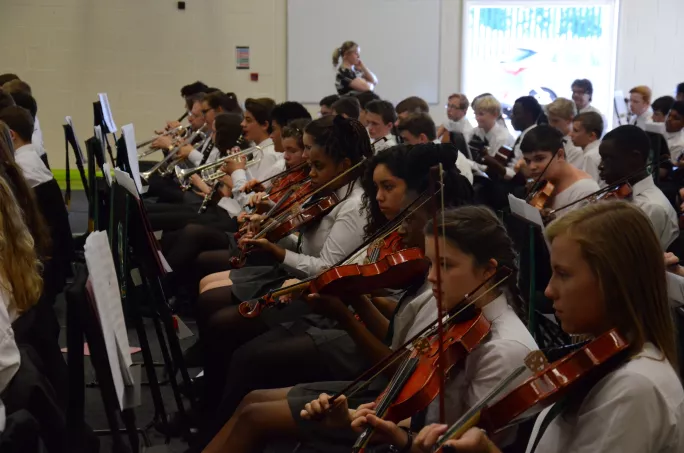- Home
- ‘Everyone says, “Isn’t it wonderful that you’ve produced this prodigy?”’
‘Everyone says, “Isn’t it wonderful that you’ve produced this prodigy?”’

“He just looked normal. He doesn’t get nervous, he just really, really enjoys playing. Playing at the Royal Wedding just didn’t faze him. He was just in the moment,” says Vicky Manderson, head of music at Trinity Catholic School, Nottingham.
“One person described it best: like lots of these brilliant performers, Sheku goes off into his own world when he’s performing, but he invites us in. His performance is him enjoying the music, but involving everyone else too. And it was captivating. I think people thought, wow this is a 19-year-old boy, just sat there doing his thing, not playing a note wrong,”
Vicky (pictured below, conducting) is talking about one of her ex-students. And this time last week, you probably hadn’t heard of the 19-year-old she’s talking about. But now it’s hard to open a newspaper or scroll down social media without seeing his name.
Sheku Kanneh-Mason (pictured above) became a household name in a spellbinding 10 minutes last Saturday when he wowed the world with a stunning Cello performance of Ave Maria at Prince Harry and Meghan Markle’s wedding. It’s estimated that 18 million Brits watched the event (and countless millions more around the world), and that 28,000 tweets were sent about his performance alone.
That his CV impressed the couple now formally styled the Duke and Duchess of Sussex isn’t surprising: at just 16 years old, he was named the BBC Young Musician of the Year in 2016, he’s held the number 1 spot in the classical chart, and has more than 2 million streams on Spotify for his composition of Bob Marley’s No Woman No Cry. He’s the London Music Masters Junior Ambassador, has played with BBC National Orchestra of Wales, City of Birmingham Symphony Orchestra and Royal Liverpool Philharmonic.
So far, so predictable for a musical prodigy.
Perhaps more counterintuitive is the fact that he spent the entirety of his secondary education at a comprehensive high school in Nottingham: Trinity Catholic School, where he was taught music for seven years by Vicky Manderson and her team.
On the face of it, this is a very ordinary school. But dig a little deeper and you find something special: this is a comprehensive with a commitment to music that may not be unique, but probably comes close.
“Everyone says isn’t it wonderful that you’ve produced this prodigy, but actually it’s wonderful that he’s shared it with us. When he arrived, he was at a higher standard on the Cello than most others would only dream of achieving,” says assistant headteacher, Steve Manderson. “That’s not to say the music department hasn’t done a lot with him, because I think they have. But it has been a very reciprocal arrangement, he works with some of our younger students and inspires them. We can’t claim responsibility for Sheku, but we like to think we’re part of it.”

His mum, says Vicky, is really grateful for Sheku’s time at Trinity: “She loves the culture of the school and how highly music is valued, and that music is here, there and everywhere, and that Sheku’s part of that, what he did wasn’t unusual to the kids. Because music goes on in the school, that’s quite a usual thing to do.”
Of course, his talent isn’t usual or ordinary. And neither is the talent of his six brothers and sisters - all of who have been, or are being, educated at Trinity. His younger sisters, Jeneba (15) and Konya (17), attend the school, and the youngest of the family, 8-year-old Mariatu, will be attending in a few years’ time.
“The school has been really supportive of all of my family; there’s a big picture of Shaku’s face in the hallway which is really surreal. And they’ve always been supportive when we’ve had concerts out of school,” says Konya.
“The success of pupils that have been here before proves what giving music to students can do. The amount of people who have come out of this school just shows that if you do give classical music to younger children, so much can come out of it.”
Trinity’s dedication to music education is, sadly, rare: a vast number of schools have removed music from the curriculum entirely: West Yorkshire’s Bingley Grammar hit the headlines when they did just, instead offering the subject as an after-school extra and charging students £5 a week for these after-school classes. In 2017, there was a 7.7 per cent decline in the uptake of GCSE music, and just 3.3 per cent of pupils have taken the subject nationally in 2018.
Yet, at Trinity, they have more than 15 per cent of pupils at key stage 4 choosing the subject.
So, how do they do it? And where did this commitment to music originate from?
Vicky explains: “In the late 1980s, the school was failing. And the headteacher at the time, Bernard Bonner, wanted to raise the standard of the school through music and sport, and get the children invested in the school.
“It took a lot of time from teachers throughout the school, both in and out of school time. We spent a lot of time taking kids to fixtures and concerts, and it really worked. Kids became much more interested in the school, standards raised and that then snowballed.”
She admits that the building is nothing special: like many schools across the country, there are leaks on a rainy day, there’s cosmetic work needed here and there, and there’s never enough space (musical instruments take up a lot of room), but the obvious commitment to music education over the last 30 years is just stunning.
To maintain all of this, says Vicky, there has to be this three-pronged approach: Leadership has to support the subject, and be invested in it; music teachers have to give up a lot of their time and be interested and enthusiastic; and the pupils have to be excited and willing to take part.
“When all three come together, it creates a really nice culture and something that the children want to be part of. Once they’re in that culture, they come at lunchtimes, they come after school, they want to rehearse and it’s a real world that they can go into and be involved in.”
And it’s a wonderful world to be in. As you enter the music department, you are hit with a wall of noise. It’s made up of a combination of both standard-sized classrooms and smaller individual rooms, all of which are connected, and none of which are soundproof. In every nook and cranny, there are pupils of all ages and abilities playing everything from a piano to a tambourine to a steel drum.
When they all come together to perform the piece they’re working on (today it was Supercalifragilisticexpialidocious, from Disney’s Mary Poppins), it’s simply brilliant. It’s not every day you see 40 Year 8 pupils, at 11am on a Friday morning, perform as an orchestra, all individually so invested.

It comes as no surprise, therefore, that so many of the pupils at Trinity choose to take GCSE music. From the very start of their secondary school careers, each and every child is given an instrument to learn. They have two hours of music a week - one traditional music lesson, and one orchestra lesson. They’re encouraged to form bands, and performances are held during lunchtimes, for which anyone is allowed to come and watch, and anyone is allowed to perform if they want to.
But, as teachers and school leaders will know, music is an expensive subject to run. School budgets are being squeezed more than ever, and maintaining Trinity’s level of dedication isn’t cheap - or easy.
“It’s really hard. If you haven’t a music department in your school already, it’s a hard thing to set up: instruments are expensive. It’s very easy to not fund it. We’ve had so many years of music focus with lots of grants and funding being brought in,” says Vicky.
She recognises that the school has been extremely lucky: for many of the last 30 years, budgets were bigger and less restrained. This allowed them to build steadily a plethora of instruments and expertise.
“Now our job is to maintain what we’ve got, and look after that. That’s the hard bit, everyone’s department has been squeezed. But we’re lucky in that we get grants from people like EMI, the Royal Concert Hall in Nottingham, and some of the opportunities the kids have had come through other orchestras working with us.”
Trinity’s reputation for excellent music teaching clearly works in their advantage when it comes to external groups coming in and working with the children: they have strong links with the National Youth Orchestra who ‘take over’ the school for weekend with workshops and concerts.
“Other schools ask us, how do you do that? Your headteacher needs to be really, really keen because there just aren’t those funds available now. It’s taken us 30 years to get here - there’s no quick fix.”
But - as the nation played witness to on that sunny Saturday morning - the hard work really pays off.
Register with Tes and you can read two free articles every month plus you'll have access to our range of award-winning newsletters.
Keep reading with our special offer!
You’ve reached your limit of free articles this month.
- Unlimited access to all Tes magazine content
- Save your favourite articles and gift them to your colleagues
- Exclusive subscriber-only stories
- Over 200,000 archived articles
- Unlimited access to all Tes magazine content
- Save your favourite articles and gift them to your colleagues
- Exclusive subscriber-only stories
- Over 200,000 archived articles



